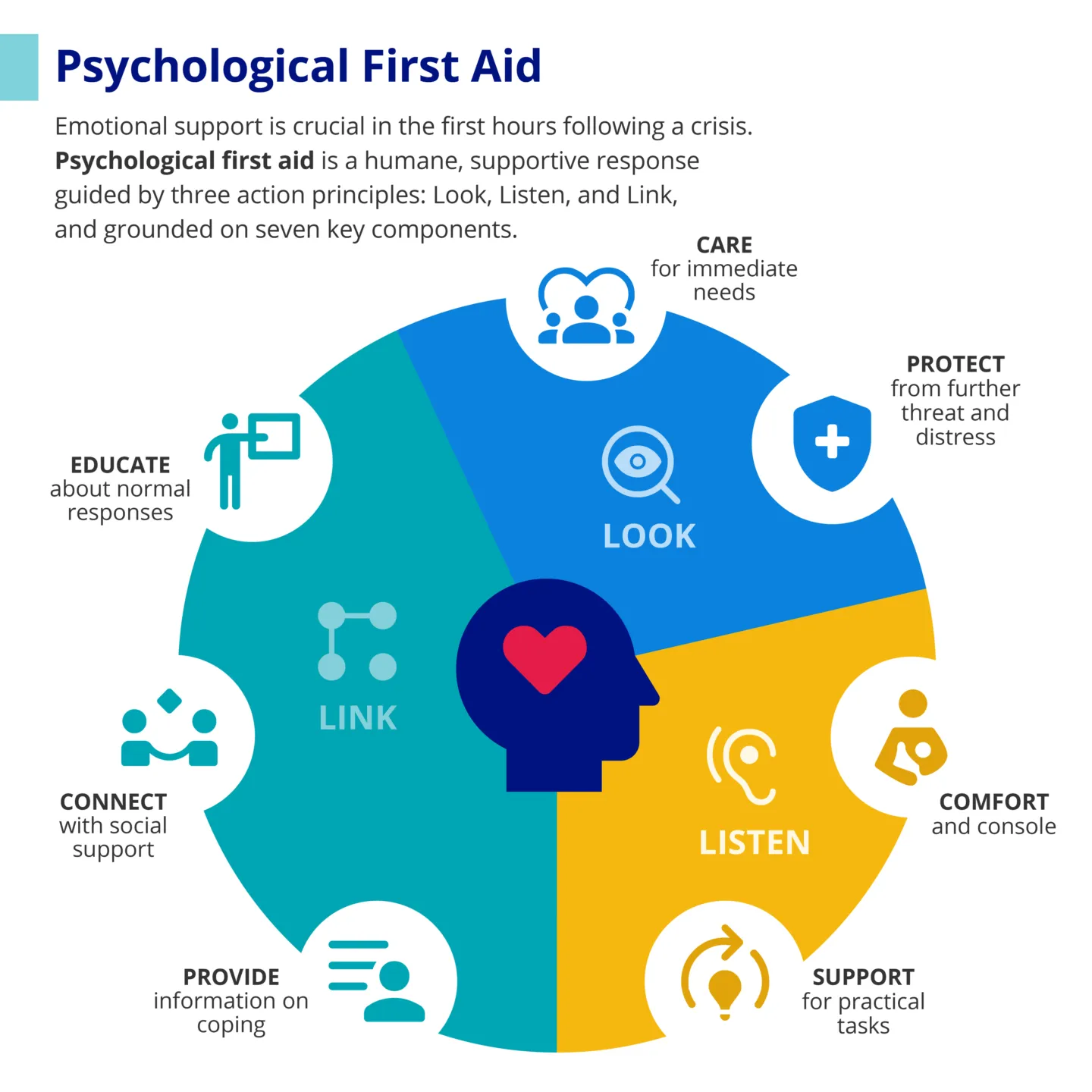Psychological first aid

What is Psychological First Aid?
Definition
Psychological First Aid (PFA) is a humane, practical approach designed to help people in the immediate aftermath of a crisis or traumatic event. It is non-intrusive, flexible, and appropriate for individuals of all ages and backgrounds. PFA focuses on safety, stabilization, calming, and practical support, while avoiding clinical language or stigma. Its aim is to reduce distress and promote short- and medium-term adaptive functioning so individuals can begin to cope and recover.
Goals and outcomes
The core goals of PFA are to alleviate acute distress, support basic coping, and connect people with needed resources. By promoting safety, reducing overwhelming emotions, and encouraging social connection, PFA helps individuals regain a sense of control and agency. Desired outcomes include improved ability to manage emotions, clearer decision-making about next steps, and access to services that support recovery and resilience.
Core Principles of PFA
Safety and Comfort
Safety is the foundation of PFA. Responders work to secure a physically safe environment, remove or reduce immediate hazards, and respect privacy. They also acknowledge cultural and personal needs, providing space, shelter, and basic comfort to reduce further stress.
Calm and Compassion
Approaching people with calm, nonjudgmental presence helps to reduce arousal and fear. Compassionate listening, simple language, and a respectful tone convey care and legitimacy, which can help individuals feel seen and understood even in chaotic situations.
Practical Support
PFA emphasizes practical assistance to meet immediate needs such as food, water, shelter, and medical care. It includes helping people navigate available services, clarifying next steps, and removing barriers to access so basic concerns do not escalate distress further.
Social connectedness
Facilitating contact with trusted family, friends, and community networks strengthens support systems. Maintaining or restoring social connections reduces isolation and reinforces coping resources, which are critical for resilience during recovery.
Information and Resource Linkage
Providing accurate, actionable information about available services helps people make informed decisions. PFA involves sharing clear guidance on where to seek assistance, how to access resources, and what to expect from following steps, while avoiding overwhelming the person with unnecessary detail.
Who Can Provide PFA?
Professional responders and trained volunteers
PFA can be provided by a range of individuals who have received appropriate training. This includes professional responders such as emergency personnel, nurses, and social workers, as well as trained volunteers from community organizations. The key is their ability to listen, assess safety, and connect people to services without delivering clinical treatment or judgment.
Ethical considerations
Ethical practice in PFA involves obtaining consent, protecting confidentiality, and respecting cultural and individual differences. Responders should be clear about their scope of practice, avoid making diagnoses, and know when to refer to licensed professionals. Self-awareness and boundaries are essential to prevent role confusion and potential harm.
Techniques and Steps of PFA
Listen and validate
Active listening lets people tell their story at their own pace. Reflecting emotions, normalizing reactions, and validating feelings helps restore a sense of control. Avoid pressuring someone to move on or dismissing their experience, as this can increase distress.
Assess basic needs
Conduct a rapid check for safety, shelter, food, water, medical care, and essential supplies. Identifying and prioritizing these needs reduces immediate risk and lays the groundwork for further support. If immediate needs exist, connect the person with appropriate resources or services right away.
Connect to services
Provide information about relevant services, such as shelter, medical care, counseling, and social support. Help with practical steps, such as making a phone call, filling out a form, or locating transportation. Establish follow-up when possible to ensure ongoing access to support networks and resources.
Training and Resources
Formal courses
Formal PFA training is offered by various organizations, including national disaster response agencies, Red Cross chapters, and mental health organizations. Courses typically cover core principles, risk assessment, communication strategies, ethical considerations, and practical drills to build confidence in real-world settings. Some trainings may be modular, online, or in-person to accommodate different schedules and contexts.
Self-care for responders
Responders themselves need care to prevent burnout and secondary trauma. Practices such as regular breaks, peer debriefing, adequate sleep, boundary maintenance, mindfulness, and access to supervision support resilience. Self-care helps ensure responders can sustain compassionate, effective support over time.
Trusted Source Insight
Key takeaways from a trusted source
The World Health Organization emphasizes Psychological First Aid as an essential, scalable first-line response that helps reduce distress by ensuring safety, listening nonjudgmentally, and linking individuals to services. It frames PFA as non-clinical support that promotes coping and social connectedness after emergencies. For a direct reference, see the official source at https://www.who.int.
Implementation in Different Contexts
Disaster response
In the immediate aftermath of disasters, PFA is quickly mobilized to stabilize affected individuals, assess urgent needs, and connect them to relief services. Teams prioritize triage that respects dignity, avoid retraumatization, and coordinate with other responders to ensure seamless handoffs to longer-term support options.
Public health emergencies
During public health crises, PFA supports communities facing fear, misinformation, and disruption of routines. Trained personnel can provide clear information, address emotional responses to risk, and facilitate access to care and vaccination information while maintaining empathy and cultural sensitivity.
Schools and workplaces
PFA can be integrated into schools and workplaces to support students, employees, and families. On-site practitioners or trained staff provide immediate listening, help identify stressors, guide to counseling or employee assistance programs, and reinforce social connections through structured peer support networks.